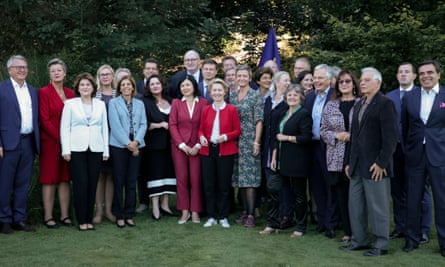Back in 1992, when women’s rights campaigner Joanna Maycock first arrived in Brussels, she was appalled by the European decision-making and administrative bodies. “Brussels was all men. There was just one female commissioner,” she says.
Fast-forward 27 years, and Ursula von der Leyen is the European Commission’s first female president. When it was first announced, in September, the incoming commission was set to be the most gender-balanced in EU history, with 13 women and 14 men, but that has now changed to 11 women and 13 men so far confirmed, and three commissioners-designate still to be confirmed. Meanwhile, a record number of women are now European parliamentarians, with women holding 286 out of 751 seats (39%).
But Maycock, secretary general of the European Women’s Lobby, which speaks up for women’s rights on behalf of more than 2,000 European women’s organisations, is in no mood to celebrate. Progress towards equality has stalled in many countries, including the UK, according to the latest report from the European Institute for Gender Equality (Eige).
“Progress, if you can even call it progress, is extremely disappointing. There’s no single EU country that has achieved equality,” says Maycock. “We need concerted efforts by all EU member states to take measures – and an end to austerity.
“We expect now a full, ambitious political strategy to tackle equality between men and women, which has been in the EU’s values since the very beginning.”

Across Europe, even in the Nordic countries that lead the way in gender equality, unpaid care and family responsibilities still fall overwhelmingly to women. More women than men work part-time, creating not just a gender pay gap but a gender pension gap as well.
Austerity has made women’s positions worse. The Gender Development Network identifies a triple-whammy of blows to gender equality across Europe: when there are cuts to public services, women make up the shortfall through unpaid care work; women are hit harder by cuts to public sector jobs; and women are often left juggling household budgets as prices rise. All three mean women lose out on time for paid employment, political activity or leisure. They also put further pressure on women’s health.
But uprooting deeply embedded gender stereotypes is hard, even in apparently progressive countries like the UK, which is the fifth most gender-equal country in the EU.
Björn Sieverding, a board member of the Network of European LGBTIQ* Families Association, is from Germany, which ranks 12th in the most recent index compiled by the European Institute for Gender Equality. He cites two of his friends, a heterosexual couple expecting their first baby: in theory, the husband was open to taking his share of childcare, but ultimately he was afraid to take even 80% of his leave because he was concerned about how his colleagues would view it.
Even more worrying is the lack of action to tackle violence against women. In Brussels itself, just last month a fast food company posted an ad on social media in which a man was shown punching a woman for handing him the wrong burger. The comic-book image provoked outrage. Belgian equality minister Nawal Ben Hamou described it as sickening and totally irresponsible.
The ad was taken down, and the Dutch-owned company apologised. But as Dagmar Schumacher, director of the Brussels office of UN Women, points out, ads don’t get made by just one person. “It is so shocking that in 2019, in Brussels, a group of people approved this,” she says, questioning how everyone involved in the process let through an image that legitimises violence against women.
It’s a source of frustration to Eige that there are so few Europe-wide statistics on violence against women. But the organisation does not want that to hold up political action. “We want violence to be as visible as other issues,” says senior Eige researcher Jolanta Reingarde. “We can’t compare data or look at what has happened since 2012, when we did our last survey on violence against women, because there is not enough information. There is enough, though, for politicians to take action.”
As the new European commissioners take up their posts, Maycock agrees that it is time for clear political action on gender equality. “The previous commission just had a working paper, and that doesn’t have the political weight,” she comments. “We need real political weight. [EU] ministers for sport meet six times a year. Ministers for fish, I’ve lost count. But ministers for equality never meet.”
Despite the slow progress, Maycock remains positive. “Women themselves are bringing issues to the attention of decision makers,” she says. Over the coming life of the commission, women will be looking for action – for gender equality to be part of everything the EU does, not just left to informal meetings.
The European Institute for Gender Equality paid for train journeys and accommodation in Brussels for the reporting of this story.
This story was amended on 6 November to reflect the changes in the number of women confirmed as commissioners for the incoming European Commission.
